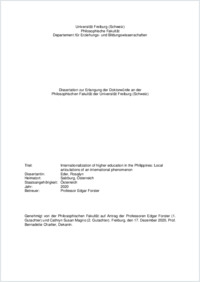Internationalization of higher education in the Philippines : local articulations of an international phenomenon
Université de Fribourg
- Eder, Rosalyn
- Forster, Edgar (Degree supervisor)
-
2020
1 ressource en ligne (302 pages)
Thèse de doctorat: Université de Fribourg, 2020
Philippine higher education
Internationalization of higher education
Discourse-Historical Analysis
Topoi
Philippinische Hochschulbildung
Internationalisierung der Hochschulbildung
Diskurshistorische Analyse
Topoi
English
German
This study examines the discourse on internationalization of higher education (IHE) in the Philippines. As a country that is invisible on the global higher education map, there is a lack of knowledge on how policies on internationalization of higher education can be understood in the context of the Philippines. This research therefore contributes to the scientific discussion by offering one of the first systematic analyses of the country’s IHE policies, while at the same time addressing the research gap on discursive practices in IHE in the country. It employs the Discourse-Historical Approach (DHA) developed by R. Wodak and others as its methodology to reveal how a global phenomenon such as IHE is translated and articulated into the country’s local frames of reference. In particular, it analyses the key topoi used in policy documents pertaining to IHE published between 1994 and 2019 and press statements released by the Commission on Higher Education from 2012 to 2019. In this study, policy is considered as texts and discourses that are in relation to one other, not in opposition. The concept of topos (topoi in plural) is understood both as the location or place of common knowledge (doxa) and the warrant or conclusion rule invoked in an argument. Thus, this dissertation focuses on the arguments used by policy makers in the policy texts to justify their claims, and how national and historical contexts interact with the global discourse to produce a specific translation, articulation, and enactment of policy. In addition, it examines how the resulting policies will impact key stakeholders in the Philippine higher education system, such as higher education institutions (HEIs), academic staff, and students. This purview also underlines the political nature of the field of higher education and IHE as a discursive space where power struggles among various policy agents and actors take place. The primary objective of this research is to situate the Philippines in a global perspective and to recognize the impact of non-state international policy actors in the country’s policy process in higher education. The Philippines’ location in international politics as a peripheral country will have a crucial impact on how it construes its national identity and its role within the global community. Ultimately, this research aims to uncover the ideologies and paradigms that drive the country’s internationalization of higher education, how language is strategically utilized in IHE conceived as a social practice, and how ideological positions are realized and manifested through language. This research project also responds to the need for integrating broader political perspectives into the study of IHE and its corroborating policy.
Diese Studie untersucht den Diskurs über die Internationalisierung der Hochschulbildung (IHE) auf den Philippinen. Als ein Land, das in der globalen Landkarte der Hochschulbildung unsichtbar ist, fehlt es an Wissen darüber, wie die Politik der Internationalisierung der Hochschulbildung im philippinischen Kontext verstanden werden kann. Diese Forschungsarbeit leistet daher einen Beitrag zur wissenschaftlichen Diskussion, indem sie eine der ersten systematischen Analysen der IHE-Politik des Landes bietet und gleichzeitig die Forschungslücke zu den diskursiven Praktiken der IHE im Land schließt. Sie verwendet den von R. Wodak und anderen entwickelten diskurshistorischen Ansatz (DHA) als Methodologie, um zu zeigen, wie ein globales Phänomen wie IHE in den lokalen Bezugsrahmen des Landes übersetzt und artikuliert wird. Insbesondere werden die wichtigsten Topoi analysiert, die in den zwischen 1994 und 2019 veröffentlichten Grundsatzdokumenten zur IHE sowie in den von der Commission on Higher Education von 2012 bis 2019 veröffentlichten Presseerklärungen verwendet werden. In dieser Studie wird Politik als Text und Diskurs betrachtet, die in Beziehung zueinanderstehen. Das Konzept des Topos (Topoi im Plural) wird sowohl als Ort des Allgemeinwissens (Doxa) als auch als Rechtfertigungs- oder Schlussfolgerungsregel verstanden, die in einem Argument angeführt wird. Die vorliegende Dissertation konzentriert sich daher auf die Argumente, die von politischen Entscheidungsträgern in den politischen Texten zur Rechtfertigung ihrer Ansprüche verwendet werden, und darauf, wie nationale und historische Kontexte mit dem globalen Diskurs interagieren, um eine spezifische Übersetzung, Artikulation und Umsetzung von Politik zu produzieren. Darüber hinaus wird untersucht, wie sich die daraus resultierende Politik auf die Hauptakteure des philippinischen Hochschulsystems, wie z.B. Hochschuleinrichtungen, akademisches Personal und Studierende, auswirken wird. Diese Sichtweise unterstreicht auch den politischen Charakter der Hochschulbildung und der IHE als diskursiven Raum, in dem Machtkämpfe zwischen verschiedenen politischen Akteuren und Akteurinnen stattfinden. Das Hauptanliegen dieser Forschung ist es, die Philippinen in eine globale Perspektive zu stellen und den Einfluss nichtstaatlicher internationaler politischer Akteure auf den politischen Prozess des Landes im Bereich der Hochschulbildung zu erkennen. Die Lage der Philippinen in der internationalen Politik als ein Land in der Peripherie wird einen entscheidenden Einfluss darauf haben, wie die Philippinen ihre nationale Identität und ihre Rolle innerhalb der globalen Gemeinschaft konstruieren. Letztlich zielt diese Forschung darauf ab, die Ideologien und Paradigmen aufzudecken, die die Internationalisierung der Hochschulbildung des Landes vorantreiben, wie Sprache in der als soziale Praxis konzipierten IHE strategisch eingesetzt wird und wie ideologische Positionen durch Sprache verwirklicht und manifestiert werden.Dieses Forschungsprojekt geht auch auf die Notwendigkeit ein, breitere politische Perspektiven in die Untersuchung der IHE und ihrer unterstützenden Politik zu integrieren.
- Faculty
- Faculté des lettres et des sciences humaines
- Language
-
- English
- Classification
- Education, teaching
- Notes
-
- Ressource en ligne consultée le 2021-01-05
- License
-
License undefined
- Identifiers
-
- RERO DOC 329911
- URN urn:nbn:ch:rero-002-119044
- Persistent URL
- https://folia.unifr.ch/global/documents/309196
Statistics
Document views: 1747
File downloads:
- Texte intégral: 1078
